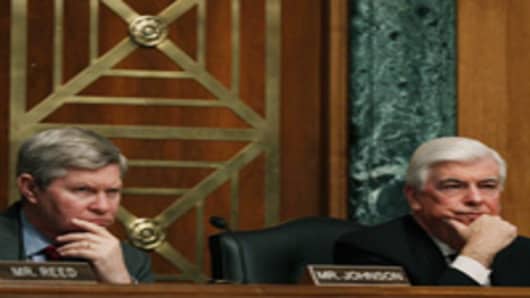“Brokers would love to be called fiduciaries,” said Tamar Frankel, a professor at Boston University School of Law. “That is not the issue. The issue is what stands behind it.”
The study being considered by Senator Johnson would examine the gaps and overlaps in regulation within the brokerage and adviser industries. Consumer groups say the issue has already been examined, most recently in 2008, when the Securities and Exchange Commission asked the RAND Corporation, a nonprofit organization, to study the business practices of broker-dealers and investment advisers. The study found that investors had trouble distinguishing among industry professionals.
A spokesman for Mr. Johnson said a study was on the table, but that it was still early in the process. “There certainly has been some concern raised on how to appropriately harmonize the fiduciary standard for investment advisers and broker-dealer to eliminate consumer confusion,” Jeff Gohringer, the spokesman, said. “And Senator Johnson is looking for ways to address it.”
The debate over brokers’ responsibility to their clients and how much they have to disclose has been evolving since the Depression, as Congress and the courts have weighed in.
The first efforts to regulate financial professionals came in 1934 and 1940, with first the Securities Exchange Act and then the Investment Advisers Act, which set out rules for brokers and advisers. The advisers were held to the stricter fiduciary standard. But the 1940 law made an exception for brokers: as long as their advice was “solely incidental” to their service as a broker, and they did not receive special compensation for advice, they were not required to act as fiduciaries. Instead, they must provide only “suitable” investments.
“Consumers are generally not aware that there are these different standards,” said Daniel J. Barry, director of government relations for the Financial Planning Association, an advocacy group for the advisers’ industry.
The planners, along with consumer advocates, support the proposal in the original draft of the Senate financial reform bill by Christopher J. Dodd, the Connecticut Democrat who is chairman of the Senate Banking Committee. That proposal would simply erase the brokers’ exemption from the Investment Advisers Act and require them to register as advisers, making them fiduciaries.
“The Dodd bill is broader and stronger,” said John C. Coffee, a professor of securities law at Columbia Law School. “In the full-scale House bill, you see how limited it is. The House makes a new limited fiduciary standard to broker dealers, but only when they are giving personalized investment advice” about securities to a retail customer.
Consumer advocates say the phrase “personalized investment advice” leaves too much room for interpretation. What is more worrisome, they say, is that the House version would also not require brokers to “have a continuing duty of care or loyalty to the customer” after providing that advice. That could lead to “hat switching,” they say, where the broker wears his fiduciary hat when giving advice, but changes to the suitability hat when recommending products.



